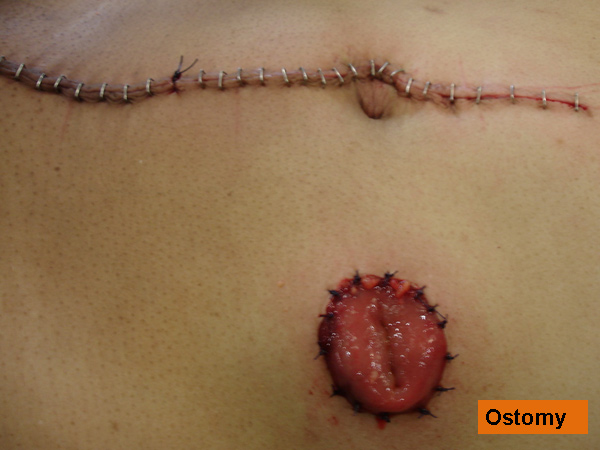STOMA CARE
Sometimes the surgeon makes an opening on the abdominal wall through which intestinal waste (faeces) can pass. This surgery is medically known as colostomy and ileostomy. Ileostomy is a surgically created opening in the small intestine - through the abdomen. Similarly, colostomy is a surgically created opening in the large intestine or colon - through the abdomen The opening itself is called a stoma. An ileostomy or a colostomy does not have a sphincter muscle, so a person cannot have a voluntary control over bowel movements. Hence, a lightweight, disposable bag is worn over the stoma.This condition is either temporary or permanent depending on your disease and surgery performed. A temporary detour can be reversed at a later time (usually 6-8 weeks; may be more in certain conditions).
There are no nerve endings in the stoma and hence it is not painful. The stoma is always red and moist like the inside of the person mouth.
After all of these surgeries, the stool consistency, amount, and frequency will depend on the type and amount of food eaten. So, this diet is to help patients gain adequate control of their bowel movements.
Generally, colostomy and ileostomy patients can easily maintain a balanced diet to provide all the vitamins, minerals and calories needed for good health. In those cases where certain foods have to be restricted to control stool patterns or stool consistency, we may prescribe a vitamin-mineral supplement.
Important guidelines for stoma patient:
1. Because each patient and type of surgery is different, no standard recommendations can be given for everyone. Most patients return to a fairly normal diet. Still, a trial and error pattern of eating is often necessary to identify those foods that may have an undesirable effect on the patient's stool. Then it is simply a matter of changing how much of these foods are eaten. The lists that follow are a guideline.
2. Eat foods at a regular time each day. Eating 4 to 6 smaller meals may help to promote a regular bowel pattern.
3. Try eating the main dinner meal at noon and a smaller meal in the evening. This helps to reduce the stool output at night.
4. Introduce one type of food at a time to test how it affects bowel function. If it does not produce a good result, stop eating it. However, as the body heals and adjusts, the offending food may become easier to tolerate, so try adding it to the diet again on several occasions before giving up on it.
5. Chew foods completely to help the digestive process. Especially avoid swallowing large pieces of leafy vegetables since they can block the stoma opening on the abdominal wall.
6. Fresh fruit may cause loose stool.
7. Drink 2 to 3 litres of water a day. This helps to keep the stool fluid, and it also prevents dehydration. Normally, the colon absorbs water and electrolytes (substances such as sodium and potassium) from the stool, so people who have all or part of the colon removed will lose more water. Because electrolytes are also lost, do not restrict salt in the diet.
8. Maintain an ideal body weight. Extra fat in the abdominal wall can make it difficult for the stoma to function properly.
9. Colostomy patients may find that foods which caused problems before surgery continue to do so afterward.
10. During the first 4 to 6 weeks after surgery, ileostomy patients should limit foods that caused problems prior to surgery. This will reduce the chance of stoma blockage and lower the amount of gas.
11. Certain medications such as Imodium or Lomotil can help to slow the bowel when diarrhea is a problem.
12. Foods containing large amounts of fiber and bran should be avoided for 6 to 8 weeks after surgery. After that time, certain bulking agents such as psyllium ( Isabgoul Husk) may help firm the stool. Only certain patients need to have a firmer stool, so do not use these agents without the physician's instructions.
Website Links
1. www.coloplast.com
2. www.hollister.com
Foods that are good for patients with stoma:
Banana, Apple, Grapes, Orange, Chickoo, Pomegranate, Plums, Figs, Pear, Sweet potato, Soya, Brinjal, Carrot, Lady finger, Pumpkin, Coffee, Tea, Rice, Wheat bran, Porridge, Non-veg soup, Ginger, Plenty of water, Fresh fruit juice.
Foods which increase stool odour :
Garlic, Cauliflower, Cabbage, Broccoli, Certain spices, Fish, Egg, Onion.
Foods that are good for patients with stoma:
Banana, Apple, Grapes, Orange, Chickoo, Pomegranate, Plums, Figs, Pear, Sweet potato, Soya, Brinjal, Carrot, Lady finger, Pumpkin, Coffee, Tea, Rice, Wheat bran, Porridge, Non-veg soup, Ginger, Plenty of water, Fresh fruit juice.
Foods that increase gas production:
Beans, Cauliflower, Corn, Cucumber, Mushroom, Peas, Spinach, Cabbage, Beans, Broccoli, Carbonated drinks, Beer.
Foods that thicken the stools :
Rice, Banana, Cheese, Milk (boiled), Toast, Yogurt, Butter milk.
Foods that may loose the stools :
Broccoli, Green beans, Beer, Spinach, Spicy foods, Fresh fruits (except banana), Grape juice.
Foods to be avoided :
Tomato, Papaya, Watermelon, Pineapple, Milk and milk products except curd and buttermilk, Peas, Tomato, Kidney beans, Nuts, Pickles, Potato.

